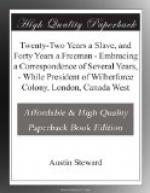One morning a man entered my store and called for liquor, which the clerk gave him. After drinking it, he went directly to the office of A. House, Esq., and entered a complaint against the clerk who had served him; then stepped out for consultation with his counsel. At that moment I arrived at the office of the magistrate to whom I immediately made complaint against myself, relating to him also just how the event happened. In a few minutes the original complainant returned, to whom ’Squire House explained that he should have arraigned the proprietor of the store, and not the clerk as he had done. Determined on making a speculation, however, he demanded a precept for myself. The ’Squire, laughing most heartily, informed him that he was too late,—that Mr. Steward had the start of him, having just entered a complaint against himself, by which he saves one half of the fine. The man walked out, looking rather “cheap,” nor did he or others annoy me afterwards by making complaints of that kind.
But now I saw, as never before, the sin of selling that which would make beasts of men, and only stopped to inquire what was duty in the matter. All the arguments in favor of its sale were more forcible then than now. All classes of persons used and drank the article; and it required more moral courage, to relinquish the business than it does now. Nevertheless, it appeared plain to my mind, that duty to God and my fellow-men required it, and I cheerfully gave it up forever.
I could not conscientiously, nor do I see how any man can, continue to traffic in this most fruitful source of pauperism and crime. No benefit whatever arises from its use as a beverage or from its sale. It is a curse to the drinker, to the seller, and to the community. Those who are licensed venders take from the government fifty dollars for every one put into the treasury. The money paid for licenses is a very meager compensation for the beggary, crime, and bloodshed which rum produces. All who have any knowledge of the statistics of the State, or of our prison and police records know, that intemperance has done more to fill the prisons, work-houses, alms-houses, and asylums of the State than all other influences combined; and yet men uphold the traffic. Their favors are for those who love its use and sale, and their anathemas for him, who is striving to save a nation of drunkards from swift destruction; yea, their own sires, sons, and brothers from the grave of the inebriate.




